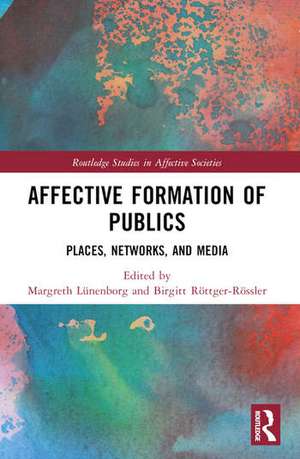Affective Formation of Publics: Routledge Studies in Affective Societies
Editat de Margreth Lünenborg, Birgitt Röttger-Rössleren Limba Engleză Paperback – 18 dec 2024
| Toate formatele și edițiile | Preț | Express |
|---|---|---|
| Paperback (1) | 311.51 lei 6-8 săpt. | |
| Taylor & Francis – 18 dec 2024 | 311.51 lei 6-8 săpt. | |
| Hardback (1) | 1047.63 lei 3-5 săpt. | +21.53 lei 7-11 zile |
| Taylor & Francis – sep 2023 | 1047.63 lei 3-5 săpt. | +21.53 lei 7-11 zile |
Preț: 311.51 lei
Nou
Puncte Express: 467
Preț estimativ în valută:
59.62€ • 61.59$ • 49.61£
59.62€ • 61.59$ • 49.61£
Carte tipărită la comandă
Livrare economică 25 martie-08 aprilie
Preluare comenzi: 021 569.72.76
Specificații
ISBN-13: 9781032430485
ISBN-10: 1032430486
Pagini: 308
Dimensiuni: 156 x 234 x 18 mm
Greutate: 0.46 kg
Editura: Taylor & Francis
Seria Routledge Studies in Affective Societies
ISBN-10: 1032430486
Pagini: 308
Dimensiuni: 156 x 234 x 18 mm
Greutate: 0.46 kg
Editura: Taylor & Francis
Seria Routledge Studies in Affective Societies
Cuprins
1. Prologue: Affective Publics and Their Meaning in Times of Global Crises; 2. Introduction: The Affective Character of Publics; PART I: Places; 3. Unhappy Objects: Colonial Violence, Maasai Materialities, and the Affective Publics of Ethnographic Museums; 4. Theater Publics in Motion: Affective Dynamics of Theater and the Street, Berlin 1989; 5. Digital Administrative Publics: Affective and Corporate Entanglements in Germany’s New Federal Portal PART II: Networks; 6. (Im)Mobility in the Americas and COVID-19: The Emergence of a Hemispheric Affective Counterpublic; 7. Women Activists Imaged Through Social Media Publics: The "Feisty Dadis of Shaheen Bagh" as Political Subjects; 8. Affectivism and Visibility in the Mediatization of Disappearing Non-Muslim Women in Pakistan; 9. Hijacking Solidarity: Affective Networking of Far-Right Publics on Twitter; 10. Affective Temporalities of Digital Hate Cultures; 11. Understanding the Affective Impact of Algorithmic Publics; PART III: Media; 12. Contested Image Practices of Public Shaming: A Case Study of an Internet Meme in the Israeli–Palestinian Conflict; 13. "GOOKS, Go Home!": Vietnamese in the United States; 14. Affective Publics and the Figure of the "Right-Wing Writer"; 15. Opening Up Ethnographic Data: When the Private Becomes Public
Notă biografică
Margreth Lünenborg is professor of media and communication studies at the Freie Universität Berlin, Germany. Her research focuses on recent changes in journalism due to digitization, gender media studies, migration and media. In CRC "Affective Societies" she heads a research project on "Journalism and its order of emotions" analyzing the affective regime of migration coverage. With a focus on affect and emotions, she has worked theoretically and empirically on questions of mediated affect, affective publics and the affective structure of digital media platforms. Her most recent book is Affective Media Practices (2021, with C. Töpper, L. Sūna, T. Maier). She co-edited the special issue “Global Inequalities in the Wake of Covid-19: Gender, Pandemic, and Media Gaps" (2023) with M. Siemon and W. Reißmann. She is co-editor of the book series Critical Studies in Media and Communication (transcript).
Birgitt Röttger-Rössler is a senior professor of social and cultural anthropology at Freie Universität Berlin, Germany. She is specialized in psychological anthropology with a particular focus on the interdisciplinary study of emotion and affect. She initiated the CRC "Affective Societies," which she directed from 2015 to 2022. Her latest research focuses on childhood, socialization, parenting and emotional development in cultural comparison as well as in migration contexts. Besides this she deals with the challenges of data management and data sharing in social anthropology. Her regional focus is on Southeast Asian societies (Indonesia and Vietnam). She serves as editor of two interdisciplinary books series: Routledge Studies in Affective Societies (with D. Kolesch) and Emotion Cultures (with A.von Poser, transcript).
Birgitt Röttger-Rössler is a senior professor of social and cultural anthropology at Freie Universität Berlin, Germany. She is specialized in psychological anthropology with a particular focus on the interdisciplinary study of emotion and affect. She initiated the CRC "Affective Societies," which she directed from 2015 to 2022. Her latest research focuses on childhood, socialization, parenting and emotional development in cultural comparison as well as in migration contexts. Besides this she deals with the challenges of data management and data sharing in social anthropology. Her regional focus is on Southeast Asian societies (Indonesia and Vietnam). She serves as editor of two interdisciplinary books series: Routledge Studies in Affective Societies (with D. Kolesch) and Emotion Cultures (with A.von Poser, transcript).









